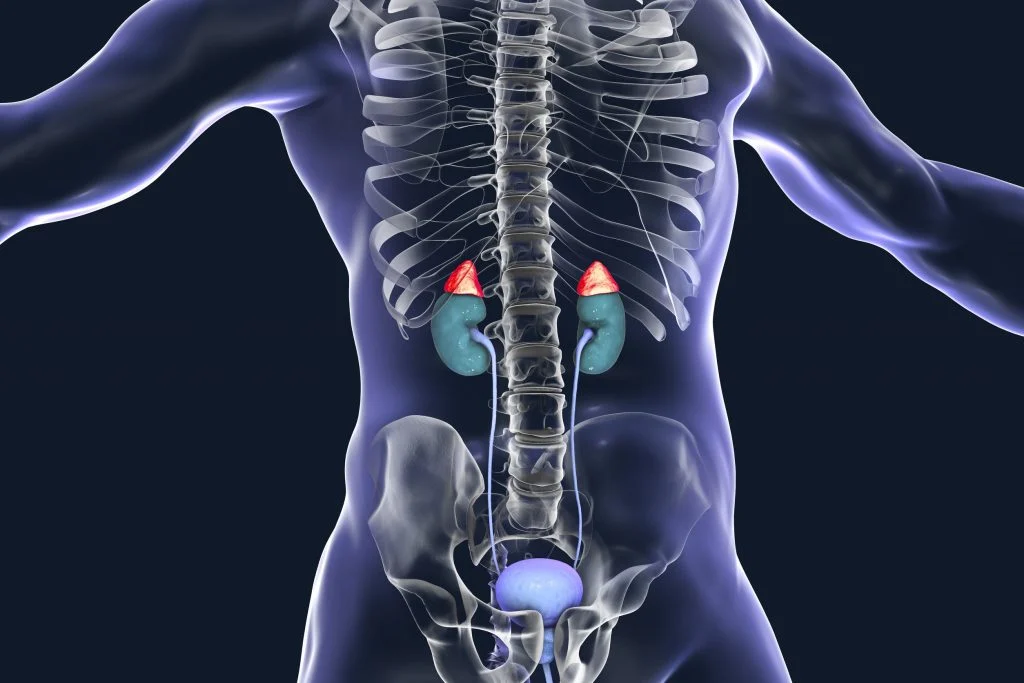
As someone who works closely with clients struggling with digestive issues, I often see a strong connection between gut health and the function of the adrenal glands. These small glands, sitting atop your kidneys, play a pivotal role in how your body responds to stress. When adrenal function is compromised (a condition often referred to as adrenal fatigue) it can have far-reaching effects, including significant impacts on digestion.
In this blog, I’ll explain the relationship between adrenal fatigue and gut health, highlight common digestive symptoms, and share practical ways to support both your adrenals and your digestive system.
The Connection Between Gut Health and Adrenal Fatigue
The link between the adrenal glands and the gut is complex, but essential to understand. The adrenal glands produce hormones such as cortisol, adrenaline, and aldosterone, which help regulate stress response, metabolism, blood pressure, and energy levels. When these hormones are out of balance, it can affect nearly every system in the body, including digestion.
The Role of the Adrenal Glands in the Body
The adrenal glands are responsible for producing hormones that manage:
· Stress response: Cortisol and adrenaline help the body respond to physical or emotional stress.
· Energy regulation: Cortisol helps maintain blood sugar levels and energy throughout the day.
· Inflammatory control: Cortisol modulates inflammation in the body.
· Fluid balance and blood pressure: Aldosterone regulates sodium and potassium levels.
These functions are crucial for overall well-being. When adrenal function is impaired, the body may struggle to manage stress and maintain homeostasis, which can ripple through the digestive system.
How Stress Impacts the Adrenal Glands
Chronic stress, whether from work, lifestyle, or emotional challenges, can overtax the adrenal glands. In response, the body may produce cortisol irregularly or at insufficient levels over time.
When cortisol production becomes imbalanced:
· Energy levels may dip, especially in the afternoon.
· Blood sugar fluctuations may occur, affecting metabolism and appetite.
· Inflammation may increase, which can impact gut lining integrity.
This chronic stress-adrenal-gut connection highlights why digestive complaints often worsen during prolonged periods of stress.
How Adrenal Fatigue Affects Gut Health
Adrenal fatigue can significantly influence gut health in multiple ways:
· Altered gut motility: Low or irregular cortisol can slow digestion, leading to constipation or bloating, or accelerate it, causing diarrhoea.
· Reduced stomach acid production: Proper levels of stomach acid are necessary for digestion and nutrient absorption. Adrenal fatigue can compromise acid production, leading to poor digestion and nutrient deficiencies.
· Gut microbiome imbalance: Chronic stress and adrenal dysfunction can alter the composition of beneficial gut bacteria, creating dysbiosis.
· Increased intestinal permeability: Compromised adrenal function can worsen inflammation and contribute to “leaky gut,” allowing toxins and partially digested food into the bloodstream.
These effects illustrate how closely adrenal function and gut health are intertwined. When one system is under stress, the other is likely to feel the impact.
Common Symptoms of Adrenal Fatigue That Affect Digestion
Clients with adrenal fatigue often report digestive disturbances alongside other symptoms. Common digestive-related signs include:
· Constipation or diarrhoea
· Food sensitivities or intolerance
· Nausea or poor appetite
· Heartburn or acid reflux
Other associated symptoms may include fatigue, brain fog, sleep disturbances, and mood swings. Recognising the digestive signs alongside general symptoms of adrenal fatigue is key to identifying and addressing the root cause.
How to Support Both Gut Health and Adrenal Function
Supporting adrenal health while nurturing your gut involves a combination of stress management, nutrition, and lifestyle adjustments:
· Stress Management Techniques
· Mindfulness and meditation: Even brief daily practice can help lower cortisol and support adrenal function.
· Gentle exercise: Activities like walking, yoga, or swimming are effective without overtaxing the adrenals.
· Adequate sleep: Prioritising 7–9 hours of quality sleep helps regulate cortisol and supports digestive function.
· Breathing exercises: Deep, slow breathing can stimulate the parasympathetic nervous system, promoting relaxation and aiding digestion.
Dietary Support
· Balanced meals: Focus on lean proteins, complex carbs, and healthy fats to stabilise blood sugar and energy levels.
· Gut-friendly foods: Include fermented foods, fibre-rich vegetables, and prebiotic sources to nurture the microbiome.
· Reduce stimulants: Minimise caffeine, alcohol, and high-sugar foods, which can over-stimulate the adrenal glands.
· Anti-inflammatory nutrients: Foods rich in omega-3s, turmeric, and leafy greens can reduce inflammation in the gut and support adrenal function.
Lifestyle Adjustments
· Manage workload and stressors: Learning to say no, setting boundaries, and creating routines can protect adrenal health.
· Hydration: Proper fluid intake supports adrenal hormone function and digestion.
· Supplement support: In some cases, B vitamins, magnesium, and adaptogenic herbs can support adrenal function—but always under professional guidance.
· By combining stress management, targeted nutrition, and healthy lifestyle habits, it’s possible to support both adrenal function and gut health simultaneously.
When to Seek Professional Help for Adrenal Fatigue and Gut Issues
While lifestyle adjustments can significantly improve symptoms, professional assessment is important if digestive issues persist. Seek guidance if you experience:
· Severe or worsening digestive symptoms
· Persistent fatigue despite lifestyle improvements
· Unexplained weight changes or nutrient deficiencies
· Symptoms of systemic inflammation, such as skin issues or frequent infections
A healthcare professional can evaluate adrenal function, perform relevant lab testing, and create a personalised plan addressing both adrenal and gut health.
Conclusion
The connection between adrenal fatigue and gut health is profound. Chronic stress and adrenal dysfunction can disrupt digestion, alter gut microbiota, and increase inflammation, leading to discomfort and long-term gut issues.
The encouraging news is that by managing stress, supporting adrenal function through nutrition and lifestyle, and nurturing gut health, it’s possible to restore balance and improve digestive comfort.
In my experience working with clients, addressing adrenal health alongside gut health creates a holistic path toward better energy, mood, and digestive function. Taking consistent, proactive steps allows the body to heal, helping you regain not just digestive wellness, but overall vitality.
References
- Evie Nutrition – “Evie Nutrition – Adrenal Fatigue and Gut Health | Does It Begin in the Gut?”
- Nature – “Gut microbiota causally impacts adrenal function: a twosample Mendelian randomization study”
- Taymount Clinic – “Taymount Clinic – Understanding Adrenal Fatigue”
- The Journal of Physiology – “The impact of acute and chronic stress on gastrointestinal …”
- Healthline – “Healthline – The Adrenal Fatigue Diet”
- Nutrition & Metabolism – “Relationship between stress, diet, and gut microbiota: a crosssectional study”
Last Updated
Uploaded by Martin Cohen on 03/11/2025






